Casio G-Shock GBD-H2000
MSRP $399.00
“The Casio G-Shock GBD-H2000 is an excellent hybrid smartwatch that puts the emphasis on great watch design, while still incorporating strong activity-tracking capabilities.”
Pros
- Refined, yet still classic G-Shock design
- Extremely durable
- Comprehensive activity tracking
- Solar charging
Cons
- No third-party app integration
- Too big to wear for sleep tracking
Don’t think of the Casio G-Shock GBD-H2000 as a smartwatch or a fitness tracker. Instead, think of it as a hybrid device that prioritizes great watch design rather than overt technology.
However, because Casio has gone all-out with the sensors and activity tracking — including partnering with a top industry expert to crunch the numbers — it has all the right sporting credentials hiding beneath its Apple Watch Ultra-beating rough-and-tumble exterior. If smartwatches and fitness trackers leave you cold, then the GBD-H2000 could be for you, as I found out after wearing it.
G-Shock GBD-H2000: design

The G-Shock GBD-H2000 (which I’ll call the H2000 from this point on in the review) is the successor to the GBD-H1000, and shouldn’t be confused with the G-Shock GSW-H1000 smartwatch that runs Wear OS. The H2000 is a hybrid sports activity watch that’s more fitness tracker than a smartwatch, but more watch than a fitness tracker, as it draws on classic G-Shock designs and then builds on the brand’s solid connected features that have been introduced on other models over the past few years.
This is quite a big watch, but in the grand scheme of G-Shock watches, it’s actually fairly modestly sized. It has a 52mm-wide case that’s 19mm thick, making it more substantial than an Apple Watch Ultra, but it’s light at 63 grams. If you’re familiar with G-Shock watches, then you’ll already know it’s best worn outside your cuff rather than under it. It’s one of the first G-Shock watches to be made from biomass plastics, something I was skeptical about, but it turns out to be a distinct advantage outside of the environmental benefits.

Unlike other resin watch bands on G-Shocks, the H2000’s biomass plastic band is flexible and pliant, making it far more comfortable to wear all day than basic resin versions. The strap itself has been cleverly designed, with masses of holes to adjust the fit, and stops under the lugs to hold it perfectly in place on the top of your wrist. It doesn’t move around, it doesn’t get sweaty, and even if you wear it tightly, it remains comfortable. It’s a big selling point. On the negative side, the overall size made it too distracting to wear overnight.
The H2000’s biomass plastic band is flexible and pliant.
The bezel is also made from biomass plastics, which cover the carbon-reinforced case and case back for ultimate durability. Casio wouldn’t use the material if it didn’t meet G-Shock’s toughness requirements, and the watch is also water resistant to 200 meters. You can see the carbon-reinforced finish on the case back, which also houses the heart rate sensor array and a small connector for USB charging. There are five clearly marked buttons on the case, and a Memory-in-Pixel (MIP) LCD screen covered in mineral glass in the center that refreshes instantly and is sharp and bright,.
The watch comes in several colors, including a basic black, a bright neon yellow/green, and the gorgeous teal you see in the photos. I think it looks great, and appreciate the slimmed-down case and incredibly comfortable band, as it makes the watch highly wearable for a G-Shock. This caveat is important. If you have never worn one of the brand’s watches before, go and try the H2000 on before buying, as the shape and size won’t be for everyone. But if this isn’t your first G-Shock, then you can buy confidently, and prepare to be surprised by just how wearable it really is.
G-Shock GBD-H2000: how it makes you feel

Most smartwatches are quite cold, in that there’s no emotional attachment to wearing one. I love the Apple Watch Ultra and do think it has a surprising amount of character for a piece of technology, but not even it comes close to wearing an actual watch on your wrist. It doesn’t have to be anything flashy or expensive, but if you chose to wear a traditional watch over a smartwatch today, it’s likely one you’ve personally chosen because you like it and the way it makes you feel.
G-Shock watches are a statement. They’re almost all big, bold, and eye-catching. They say something about you as the wearer and raise a smile when you look at it on your wrist. It does for me, and I miss that when I wear a smartwatch, but the H2000 allows me to have that joy and still be able to track my activity during the day, without missing notifications. Casio is one of the few watchmakers to take connected technology and integrate it into a watch brand without losing what makes it special, and it sets the H2000 apart from models made by Fitbit, Garmin, Samsung, and others.
G-Shock GBD-H2000: activity tracking
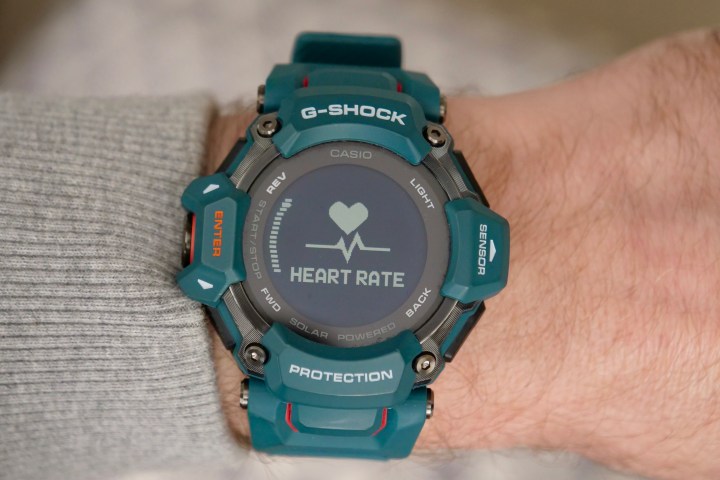
There are multiple sensors inside the H2000 that allow it to track health and activity, so making it comfortable to wear for long periods was essential. The optical heart rate sensor on the back measures heart rate and blood oxygen levels, plus there’s an accelerometer for step count, a gyroscope for swim tracking, and built-in GPS. It also has a magnetometer, a barometer, and a thermo-sensor for compass duties and to monitor changes in air pressure and temperature.
Where previously Casio worked with Firstbeat (now owned by Garmin) to collate and analyze data, for the H2000, it has worked with well-known sports activity brand Polar. However, this doesn’t mean you use the Polar app, as everything that Polar brings to the H2000 happens in the background. You can see all the collected data in the Casio Watches app, and it’s synced across using a Bluetooth connection.
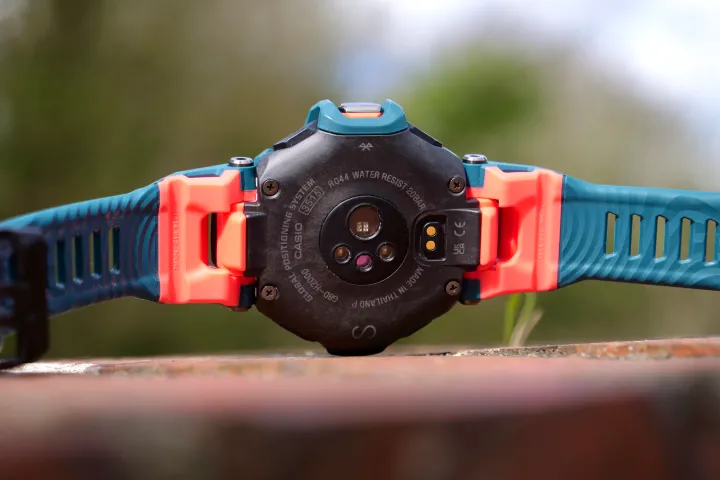
The focus is on running, walking, and swimming, but it will also track gym workouts, cycling, and interval training. It’s comprehensive enough to be useful for most folks, and the information collected and shown should appeal to people who are really driven to improve their fitness level. Polar’s displayed data includes VO2 max, cardio load, running index, energy used, and your training strain and recovery.
Important data is shown on the watch’s screen, and you don’t really have to use the app unless you want to see historical data. Each workout concludes with screens showing average and maximum heart rate, cardio load, and a breakdown of your energy used, along with distance and other sport-specific information. The screen is sharp and bright, and I haven’t had any problem seeing it clearly outside, provided the backlight is active.
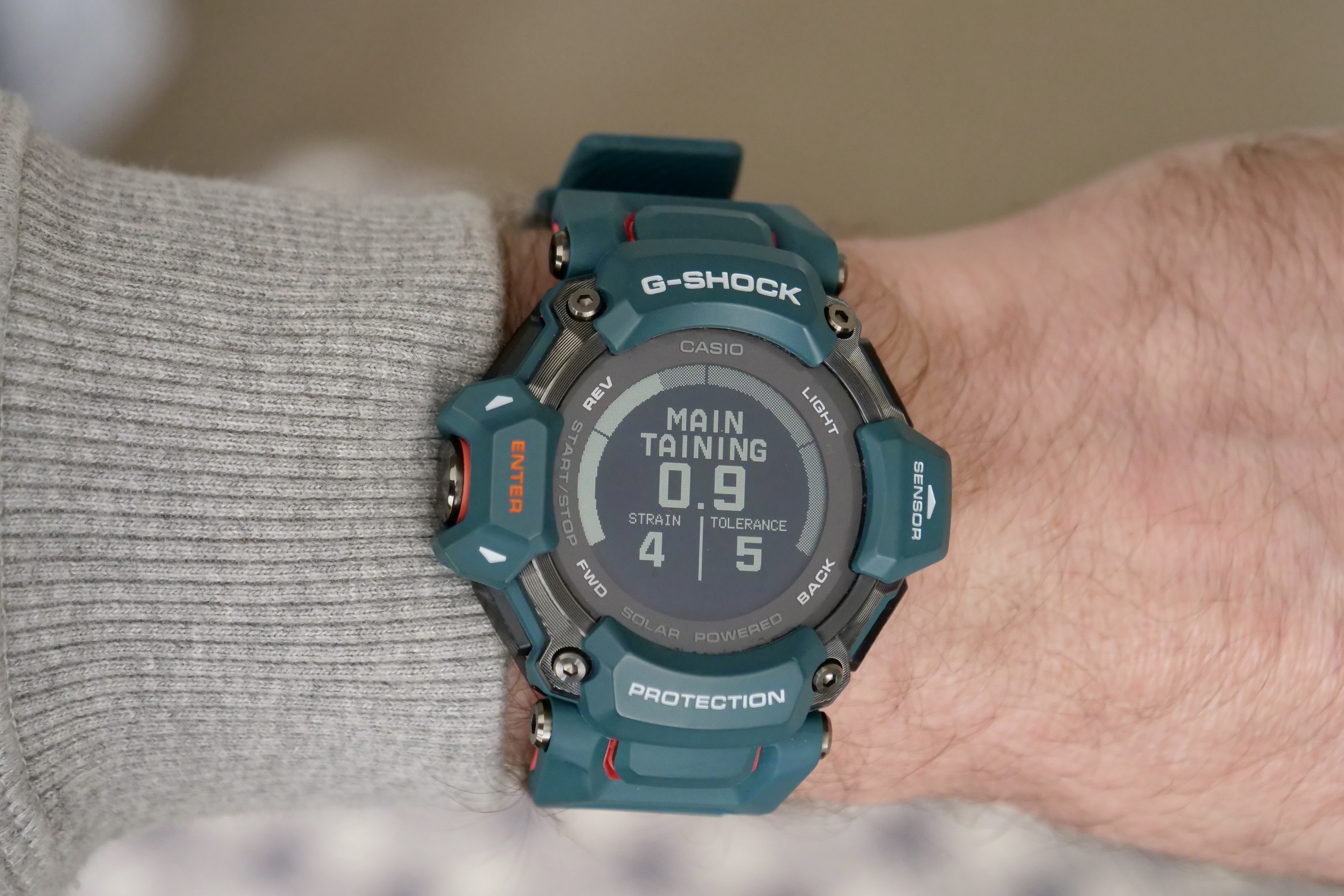
Andy Boxall/Digital Trends
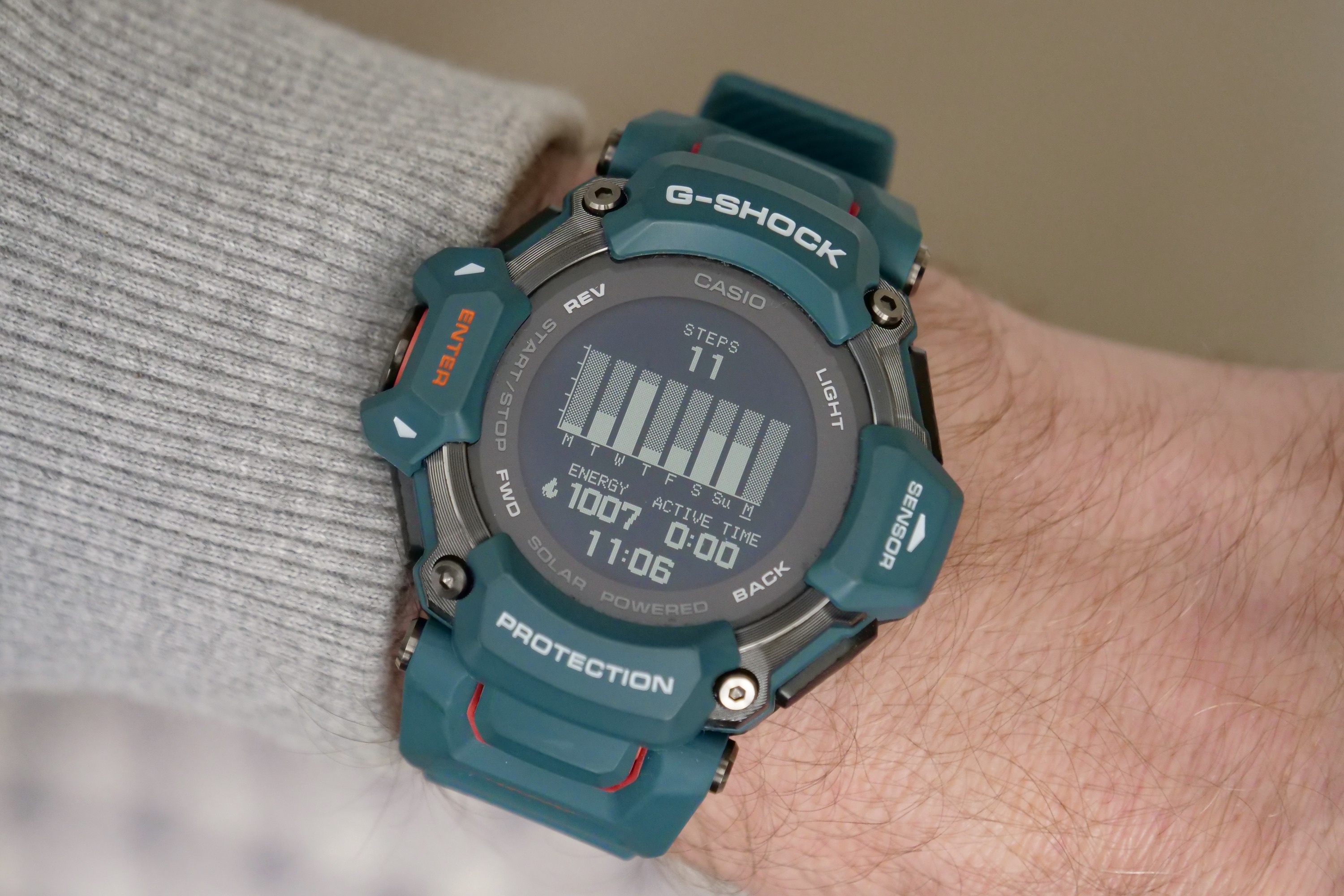
Andy Boxall/Digital Trends
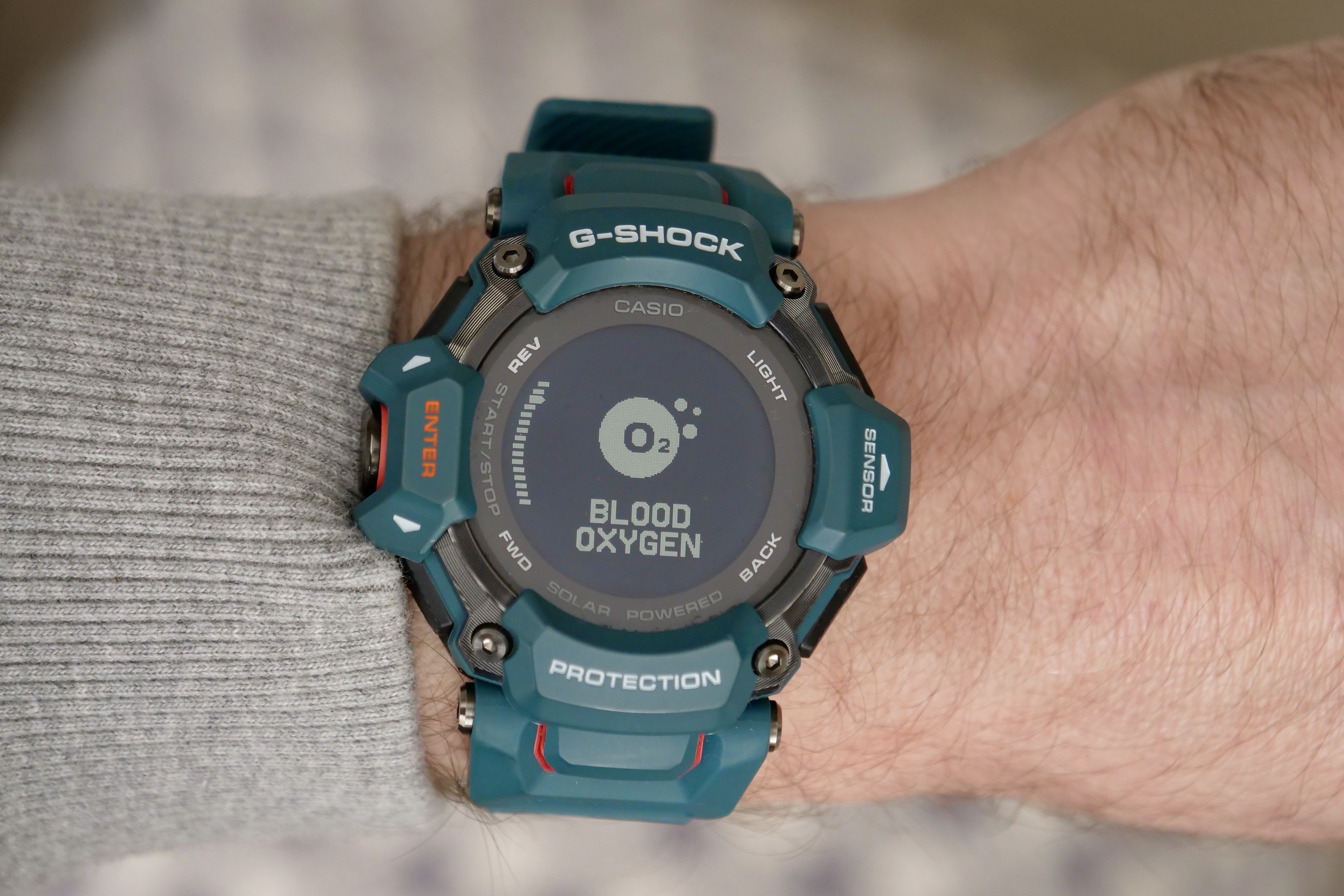
Andy Boxall/Digital Trends
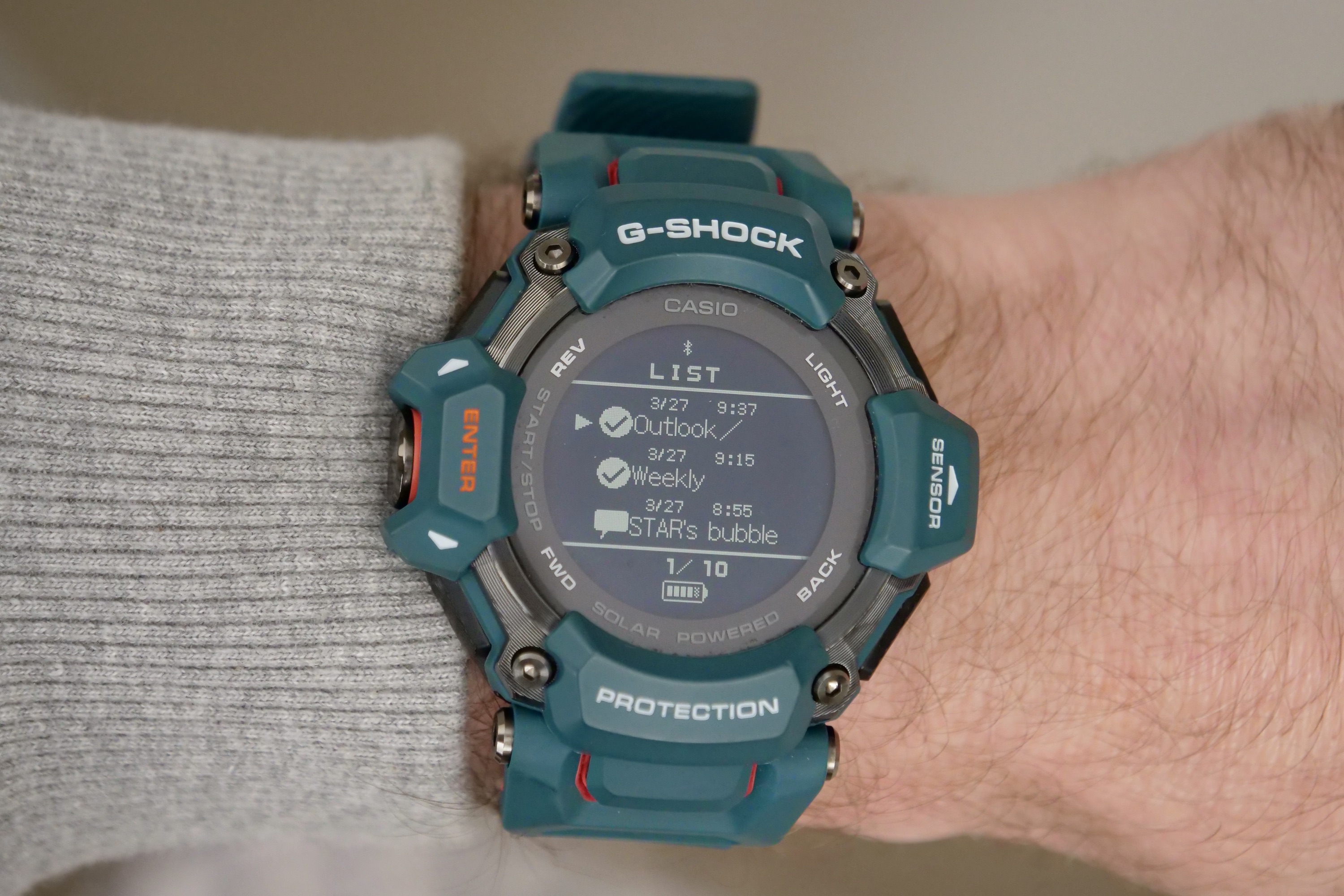
Andy Boxall/Digital Trends
Polar’s algorithms and technology give the H2000 credibility, as the name will be familiar to more people than Firstbeat. Just don’t expect it to be a G-Shock with Polar’s app and user interface. Instead, it’s very similar to the G-Shock GBD-200’s user interface, with big, bold graphics and text that is navigated using the FWD, REV, and Enter buttons on the case. It’s basic, but it works, and there’s no touchscreen to grapple with either, so it doesn’t matter if your fingers are wet or you’re wearing gloves.
Starting and ending workout sessions requires a few button presses, and saving the data at the end takes a few seconds. It’s very easy and user-friendly, yet still suitably powerful for anyone really into sports. One letdown is the lack of third-party integration, as there’s no way to directly sync your workouts to Apple Health, Google Fit, or other apps. This makes it feel quite insular and means it a different proposition to an Apple Watch Series 8, Fitbit Sense 2, or Garmin Forerunner 265.
G-Shock GBD-H2000: app and notifications
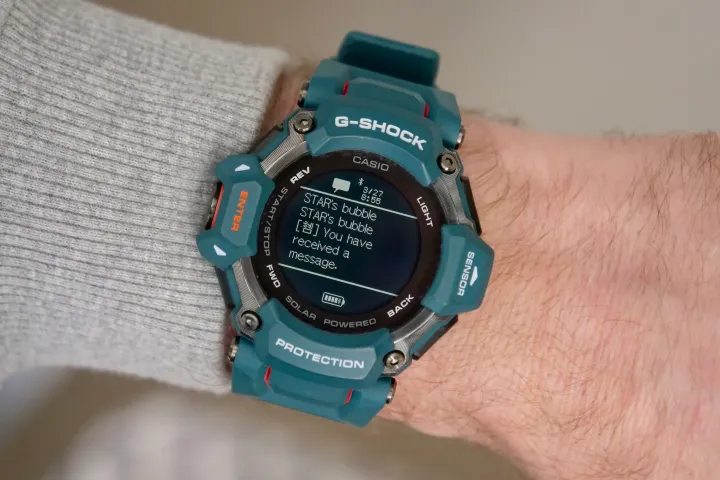
The H2000’s connected features are superior to those of most other G-Shock watches with a Bluetooth connection, as you will be able to see notifications from your phone. I’ve used the watch connected to an iPhone 14 Pro, and for the most part, it has been reliable, but I have had repeated “ghost” notifications from certain system apps that had been used, including Apple Pay.
Notifications arrive with a noticeable vibration alert and a beep too, which is on by default, but can be switched off in the app. You can view the basics on your watch, and it’s more than enough detail to assess if it’s worth getting your phone. Plus, all notifications can be recalled through a list page showing all recently received messages. It’s helpful and more than enough for what is mostly a sports watch.

The Casio Watches app is multifunctional and a little busy. It acts as a place to collect together all your G-Shock watches, has a splash page with ads for other G-Shock watches, and is also where you can view all your fitness and activity data. It’s not the most pleasantly designed app, and it takes some effort to dig into all the screens before you find what you want. It is also not a substitute for a single, focused app solely created for the H2000’s fitness data.
It takes a little time to sync data from the watch, but you don’t have to prompt it to do so outside of opening the app. Elsewhere. there are multiple aspects of the watch to customize, from the watch face to the time zones shown, as well as plenty of customizable features related to sports and tracking. There is lots of functionality, but the design doesn’t lend itself to comfortable browsing, and many of the features will be superfluous to those who simply want to see their latest fitness stats.

The Apple Fitness app, the Whoop 4.0 and Oura Ring’s app, and even Garmin’s equally busy app all provide a superior user experience to the Casio Watches app, where the fitness side feels like an afterthought and its integration seems to be an excuse not to develop a separate app.
It works, and I haven’t had any reliability problems, but it’s not the most focused fitness app you can get with a wearable.
G-Shock GBD-H2000: battery and charging
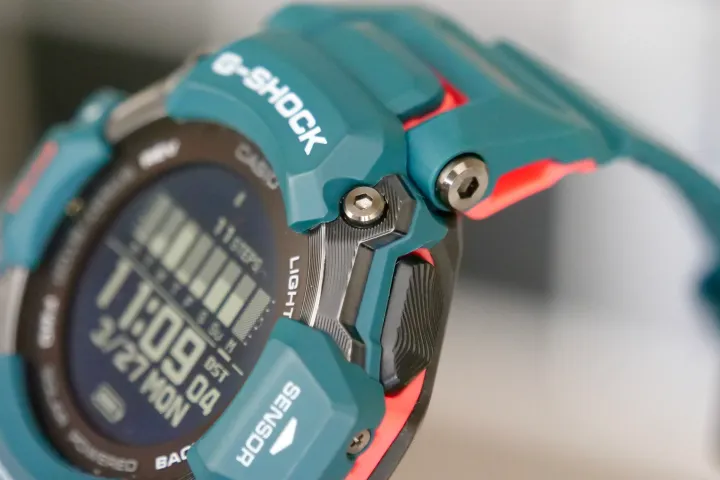
Do you hate charging your smartwatch? You’ll love the H2000, because it uses solar charging to keep the battery topped up, and provided it sees sunlight on a regular basis, you’ll never have to plug it in. Should the battery run right down, the option to use a regular charger is there, and a proprietary cable is included.
I’ve been using the H2000 every day for more than a week, and there is little to no sunlight in the U.K. at the moment, but the battery meter shows the battery has been reduced by a single bar out of the five available. I don’t expect it to be an issue once the weather improves.
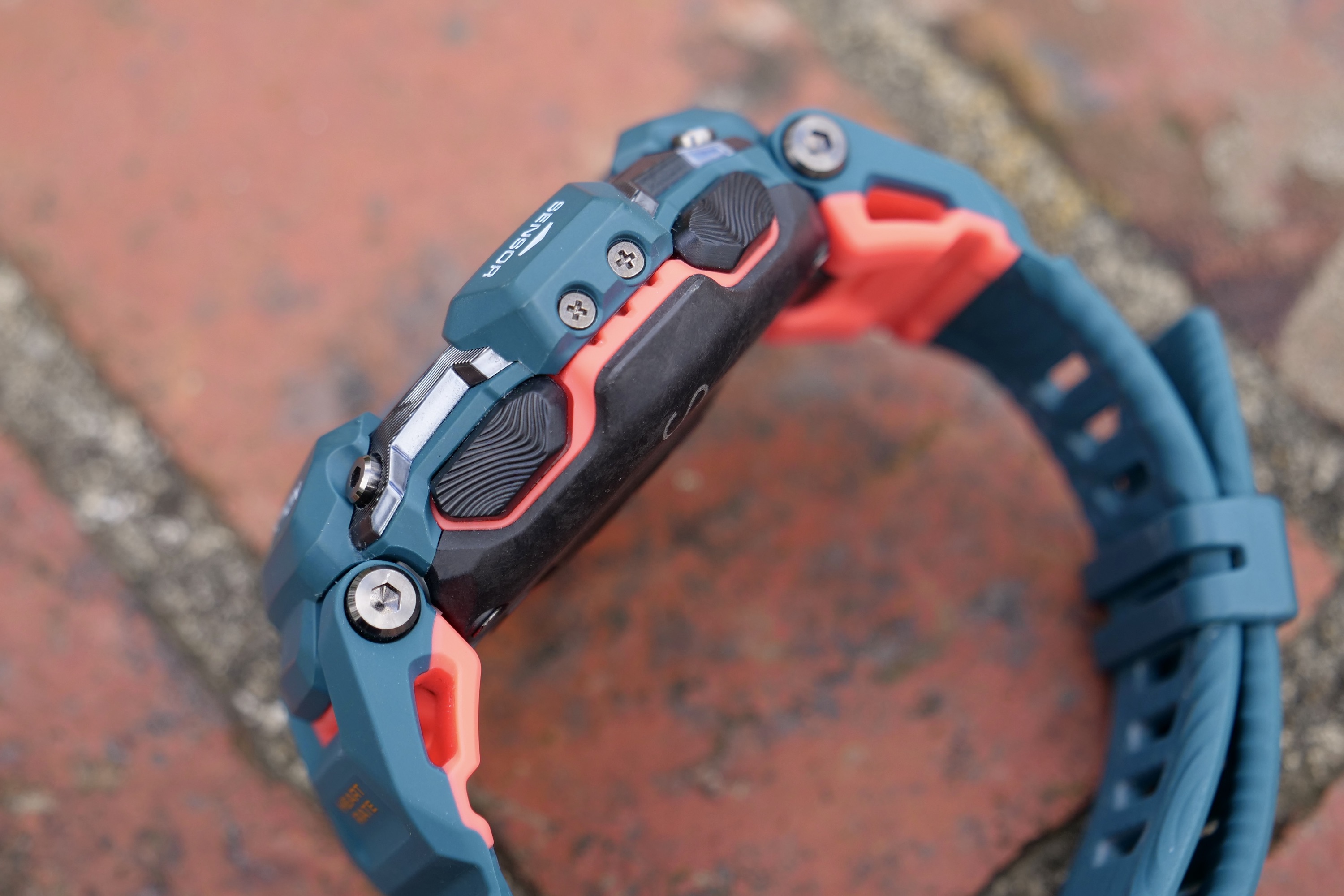
Andy Boxall/Digital Trends
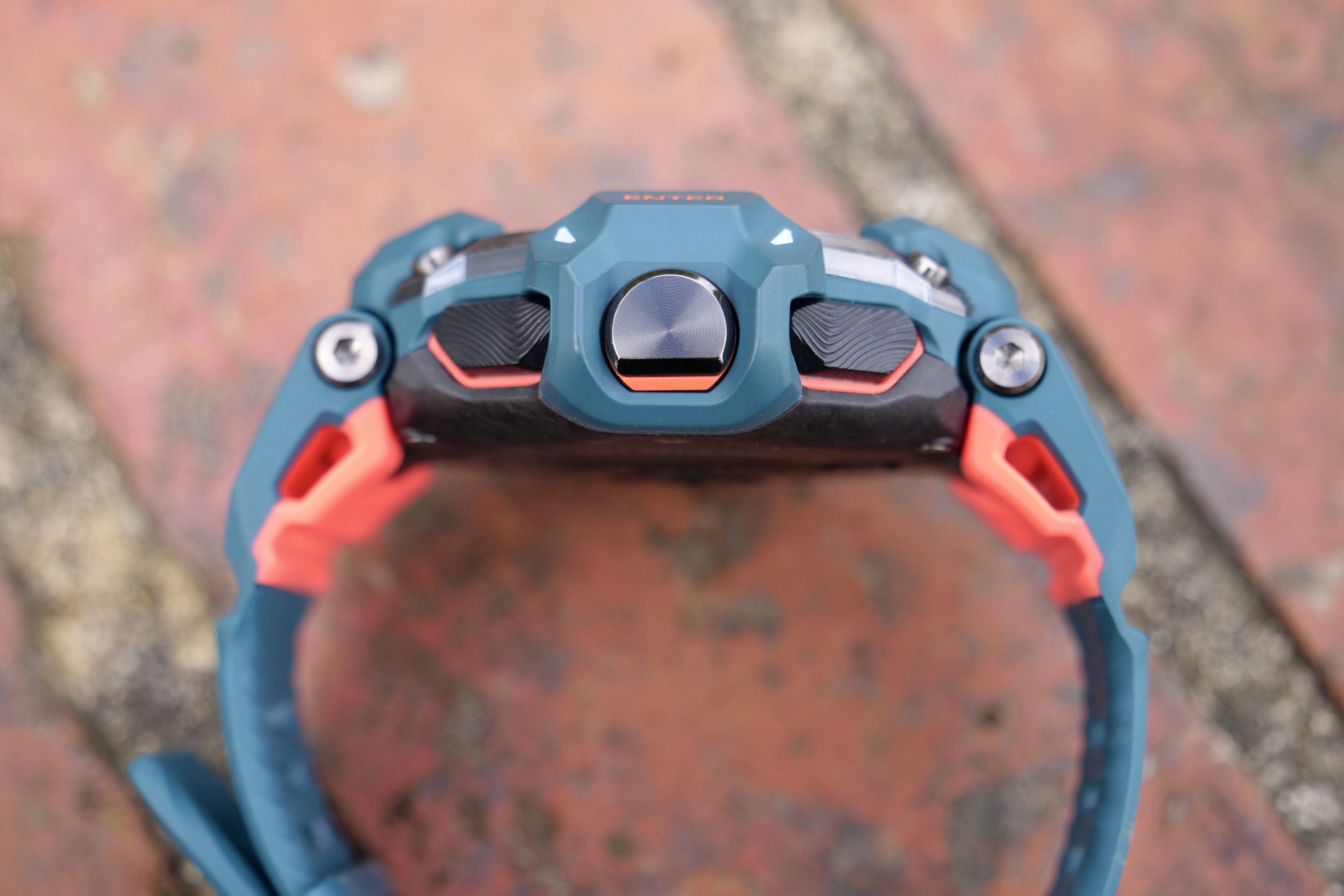
Andy Boxall/Digital Trends

Andy Boxall/Digital Trends
The convenience of not having to charge the battery is another big selling point for the H2000, considering it handles notifications, GPS, and all your fitness tracking. Obviously, using all these power-hungry features will drain the battery more quickly; use the GPS continuously when tracking an activity, and the battery will run out in about 15 hours. However, Casio estimates two months of use with no sunlight exposure when in watch mode with the heart rate sensor active, so you won’t have to worry too much.
G-Shock GBD-H2000: price and availability
The Casio G-Shock GBD-H2000 is available to buy now for $399, or 379 British pounds. It comes in four different colors, but with no variation in cost. The model in our photos is the GBD-H2000-2ER, while the bright neon yellow model is the H2000-1A9ER, the black version is the H2000-1BER, and the black with red accents model is the H2000-1AER. You can find the H2000 in G-Shock’s retail stores and its online store and through other outlets, including Amazon.
This makes it the same price as an Apple Watch Series 8, and a little more than a Samsung Galaxy Watch 5, both of which are our top recommended smartwatches. It’s also more expensive than the Fitbit Sense 2, a good choice if you’re sold on Fitbit’s platform.
The thing is, I don’t see the H2000 as a competitor to these models. It’s a distinct alternative if you value superb watch design over screen sizes and processor speed, but still want the convenience of connected tech and varied health-tracking features. In that way, it’s similar to the G-Shock GBD-200.
G-Shock GBD-H2000: verdict

What’s interesting about the G-Shock H2000 is how it doesn’t fit into either of the established wearable categories, as it’s not tech-centric enough to be an Apple Watch Ultra alternative, and its classic G-Shock design and toughness set it apart from fitness trackers made by companies like Fitbit. It’s a hybrid, but not like the Garmin Vivomove Trend, which is really a smartwatch that looks like a watch. The G-Shock H2000, on the other hand, is a watch that functions as an activity tracker.
This sets it apart, as there aren’t many really good hybrids like the G-Shock, and it really is very good. The slimmed-down, lighter-weight chassis, and the new biomass plastic band make it comfortable for all-day wear. Plus, the fitness tracking is comprehensive enough to encourage both casual and more serious sportspeople.
The watch’s operation is simple, and the heart rate and blood oxygen sensor mean it returns helpful data too. The Casio Watches app is the only weak link, as it’s not as well designed as the apps from Garmin, Apple, or Fitbit, and doesn’t provide third-party integration either. Outside of this, the fitness tracking is varied and accurate, but I can’t deal with the size of the watch to make use of its sleep tracking.
The combination of eye-catching G-Shock design, absolute toughness, solar charging, on-wrist comfort, easy activity tracking, and notifications makes the H2000 a highly recommended purchase for those otherwise not on board with the wearable tech concept due to ugly fitness trackers and overly complicated smartwatches.
Editors’ Recommendations

